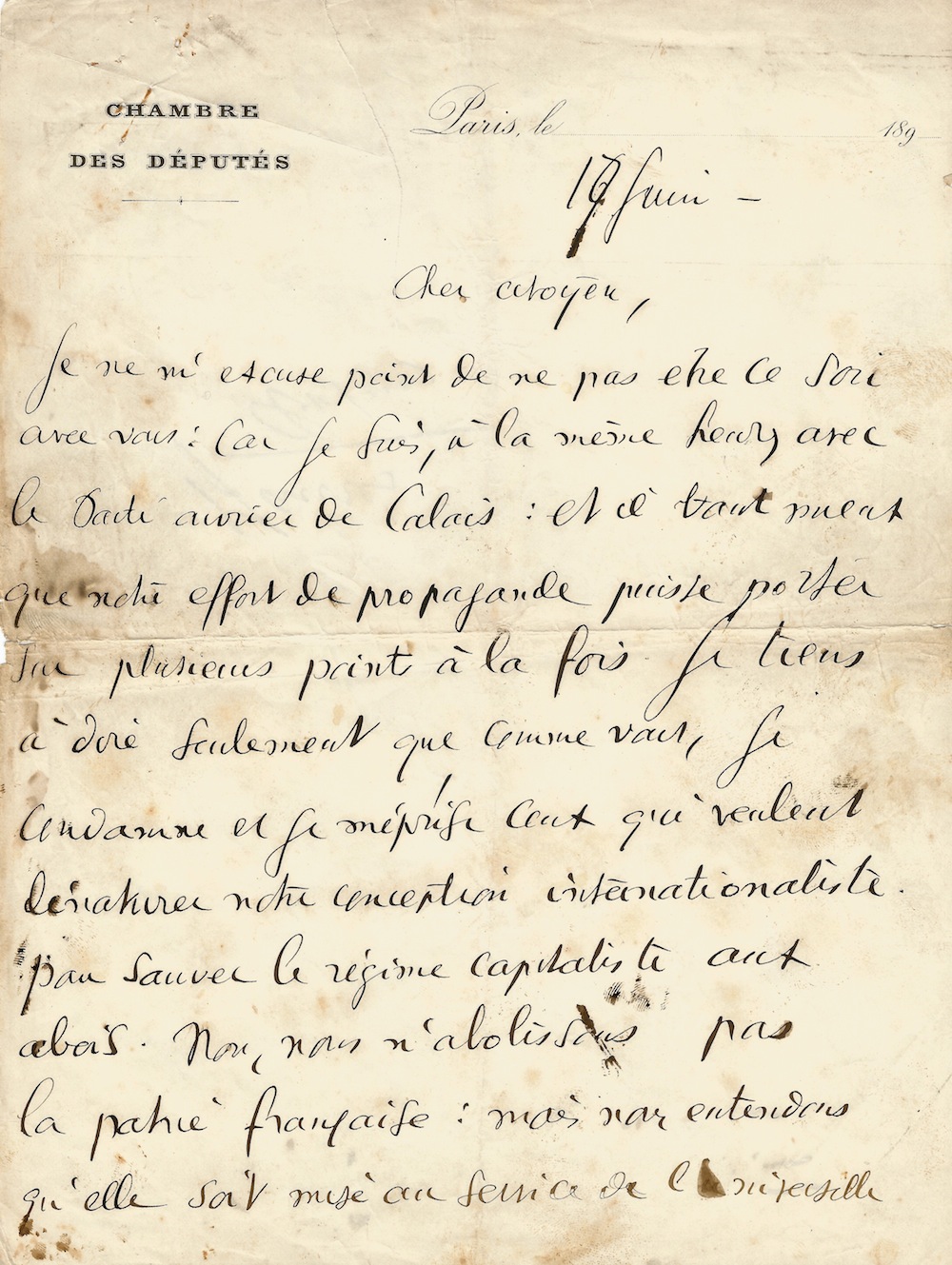Jean Jaurès (1859.1914)
Signed autograph manuscript.
Six pages in-4° on letterhead of the Chamber of Deputies.
Paris, June 17 (Circa 1895).
Remarkable plea from Jaurès, affirming here the full force of his patriotic, republican and humanist ideas while insisting on the necessity of socialism as a universal value.
“Dear Fellow Citizen, I make no apologies for not being with you this evening: because I am at the same time with the Calais Workers' Party. And it is better that our propaganda effort can focus on several points at the same time . I would only like to say that like you, I condemn and despise those who want to distort our internationalist conception to save the capitalist regime in dire straits. No, we are not abolishing the French homeland : but we intend that it be placed at the service of universal human justice, and that it contributes with the workers of all peoples to the emancipation of the proletariat . The idea of homeland and the very idea of France has changed meaning several times in history. France was at first only the rural domain of King Capetian, a sort of large farm that his masters defended against invaders and plunderers, just as the owner today defends his land against poachers or marauders. Then, as the monarchy strengthened and enlarged its power and its domain, it was like a vast administrative, military and fiscal dependence on the royal power. Chivalric honor, monarchical courtesy and the arbitrariness of stewards gave, from François I to Louis XIV, unity to the nation and a defined meaning to the word homeland. Then, with the 18th century, the meaning, the definition of France changed again : it was at the same time a boudoir where ending absolutism had fun with its mistresses and a philosophical salon opening onto the whole of Europe, filling the world. from the noise of his talks. Then, suddenly, with the Revolution beginning and the Revolution threatened, the homeland takes on another meaning, both more tragic and more grandiose: it is the advent of French Democracy; it means freedom and fraternal unity. It also means humanity because it is for the world that the Revolution wants to fight and suffer . She is indeed the giant that Hugo speaks of in these verses published a few days ago: “blood came out with light”. She was both patriotic and internationalist. Like her, we are both patriots and internationalists . We do not copy it: we do not ape it. She has done her work and we must do ours. The French homeland is not for us a pure philosophical affirmation of freedom and fraternity: it is a center of inviolable, intangible republican freedom, where the socialist idea will henceforth be developed. It is no longer through a mystical appeal to universal fraternity that it will play a great role in the world: it is by contributing to the international organization of the proletariat which will carry everywhere monarchy, militarism and capitalism. Is there anyone among those who outrage us, who give the idea of the French homeland such a noble and beautiful meaning ? So let them stop covering class interests with the beautiful name of patriotism. Let the capitalist bourgeoisie stop donning the armor of Joan of Arc : at the end of the stock market operations where it subscribes to the loans of the triple alliance, it will be difficult to take it for a new representation of the virgin of Domrémy. Best regards to you and our friends. Jean Jaurès .
Elected deputy to the Chamber in January 1893 as an independent socialist, Jaurès became the defender of the working class in struggle. As a historian of the French Revolution, Jaurès easily referred to revolutionary values as universal values engraved in stone in the Declaration of the Rights of Man and of the Citizen. We find here through this letter the idea of the danger that too great capitalist concentration would pose to the people, as well as the call for the union of the proletariat.






